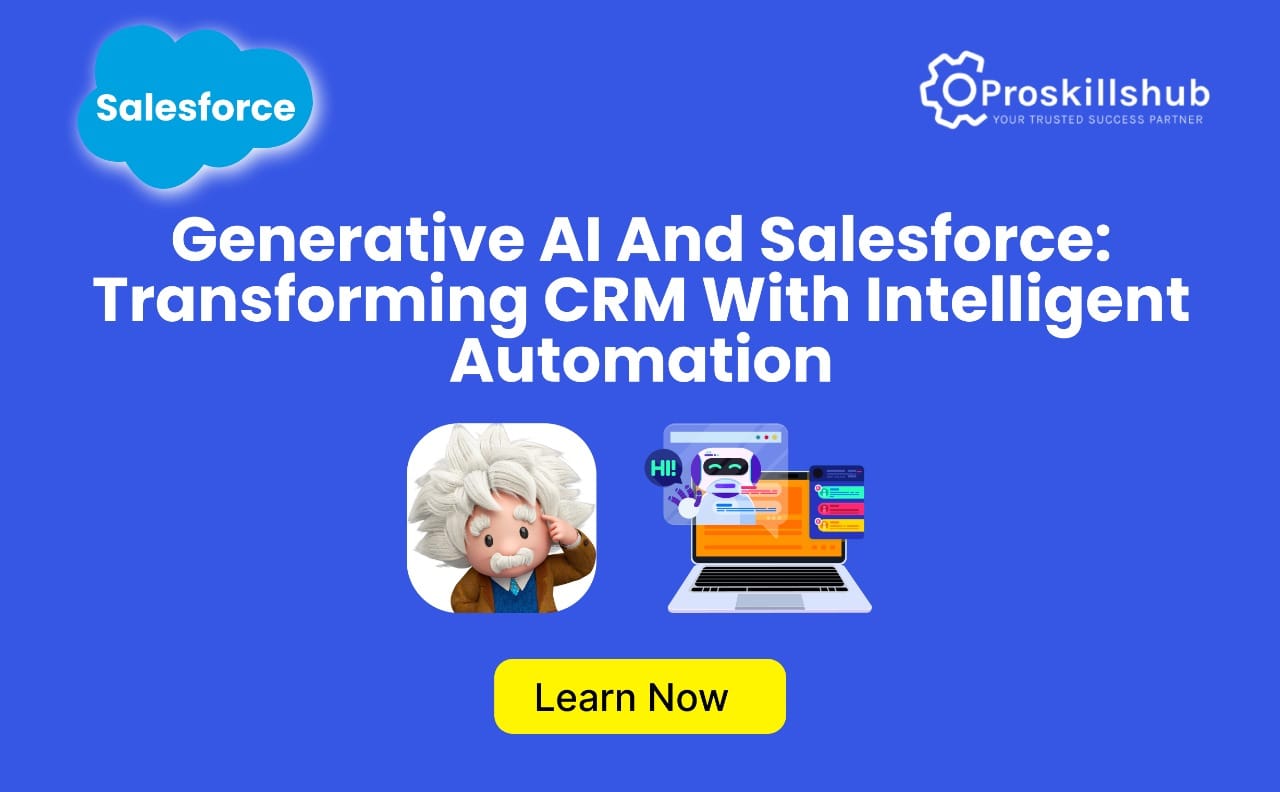In today’s digital landscape, businesses are continually adapting to enhance customer experiences, streamline operations, and build stronger client relationships. Customer Relationship Management (CRM) systems like Salesforce are at the forefront of this evolution, allowing organisations to simplify interactions, manage data efficiently, and cultivate enduring customer connections. However, as customer expectations continue to rise, businesses encounter new challenges in providing personalised, high-quality service on a large scale. With the advent of Generative Artificial Intelligence (AI), Salesforce is achieving unprecedented levels of automation, personalization, and efficiency.
Generative AI is transforming the way businesses engage with customers by enabling CRMs to analyse extensive data sets and generate relevant, dynamic content and responses tailored to individual customer needs. This innovation allows Salesforce to automate routine tasks, predict customer behaviour, and create personalised communications, all while conserving time and resources. With AI-driven insights, companies can gain a deeper understanding of their customers, anticipate their needs, and engage them proactively, resulting in increased customer satisfaction and loyalty. By integrating Generative AI capabilities, Salesforce equips businesses to operate more intelligently, respond more swiftly, and maintain a competitive edge in a rapidly evolving market.
This blog delves into the influence of Generative AI on Salesforce, highlighting how this powerful synergy is reshaping CRM strategies, revolutionising customer interactions, and opening up new avenues for growth and success for businesses around the globe.
What is Generative AI?
Generative AI, or Generative Artificial Intelligence, describes an AI type that creates new data by learning patterns from existing information. Unlike traditional AI, which often aims to automate tasks or predict outcomes, Generative AI can produce new content such as text, images, music, and even code. Popular Generative AI models include language models like OpenAI’s GPT-3, which powers many -used conversational AI systems. In the CRM world, businesses use Generative AI to customise customer interactions, improve customer service, and streamline marketing tasks. This “Gen AI” technology changes how companies work by enabling CRM systems like Salesforce to offer unmatched customization and responsiveness.
The Role of Generative AI in Salesforce
Salesforce, a top CRM platform, has jumped on the Generative AI bandwagon with its Einstein GPT and other AI-powered tools paving the way for new methods of customer interaction and smart automation. By bringing Generative AI into Salesforce, CRM systems can do more than just handle data; they can offer meaningful practical exchanges with customers.
Some key applications of Generative AI in Salesforce include:
Automated Content Generation
Generative AI allows Salesforce to create personalised content for customer emails, product descriptions, and targeted ads automatically. This is especially beneficial for sales and marketing teams, as they can leverage AI-driven automation to tailor messages on a large scale, enhancing customer engagement and boosting conversion rates.
Enhanced Customer Insights
With Generative AI, Salesforce Einstein can analyse unstructured data from customer interactions, social media, and product reviews, turning this information into actionable insights. By identifying patterns and trends in real-time, Generative AI enables businesses to gain a deeper understanding of their customers and anticipate their needs more effectively.
Sales and Marketing Automation
Generative AI can refine sales and marketing strategies by evaluating past campaign performances and customer feedback. AI-driven automation generates insights that enhance targeting, refine messaging, and optimise content delivery, making campaigns more effective while minimising manual effort.
Intelligent Lead Scoring
Generative AI improves lead scoring by examining customer data and interactions to identify high-potential leads. This allows sales teams to concentrate their efforts on the most promising opportunities, thereby increasing conversion rates and reducing time spent on lower-quality leads.
Conversational AI in Customer Support
Salesforce’s Einstein Chatbot, powered by Generative AI, improves customer support by automating responses to frequently asked questions. Einstein GPT enables these chatbots to engage in contextual and personalised conversations, providing customers with a more human-like experience and quicker resolutions.
Generative AI Services and Their Impact on CRM
Generative AI services are advancing quickly, with top technology providers offering a range of tools to facilitate AI integration for businesses. These services allow companies to utilise Generative AI without needing to create models from the ground up. A notable example is AWS Generative AI, which equips organisations with the necessary infrastructure and tools to train and deploy AI models. Services like AWS enable businesses of all sizes to incorporate sophisticated AI capabilities into their systems and CRM platforms such as Salesforce. Generative AI in India: A Growing Landscape
Generative AI in India: A Growing Landscape
Globally, Generative AI is on the rise, and India is no exception. Indian companies are increasingly investing in Generative AI applications to propel digital transformation. Numerous businesses in India are leveraging Generative AI to improve customer experiences, optimise operations, and foster innovation across various sectors, including finance, healthcare, and e-commerce. In this evolving landscape, Salesforce and AWS Generative AI are essential, providing companies with the resources to enhance customer relationship management and drive growth.
Benefits of Generative AI in Salesforce CRM
Personalised Customer Engagement
Generative AI empowers businesses to tailor every interaction, whether through customised email campaigns, dynamic website content, or targeted advertisements. By gaining insights into each customer’s preferences, companies can craft experiences that are both unique and meaningful.
Improved Customer Support Efficiency
Generative AI tools, such as the Salesforce Einstein Chatbot, enhance support operations by managing routine inquiries. This allows customer service representatives to dedicate their time to more complex issues, boosting efficiency and shortening response times.
Scalable Lead Generation
With intelligent lead scoring and qualification, Generative AI assists businesses in pinpointing high-quality leads, minimising time spent on less promising prospects and streamlining the sales process.
Cost Efficiency and Productivity Gains
By automating repetitive tasks, Generative AI lightens the load for employees, enabling them to focus on activities that have a greater impact. This results in cost savings and increased productivity, benefiting organisations overall.
Challenges of Implementing Generative AI in Salesforce
Data Privacy and Compliance
Using Generative AI for customer interactions means dealing with sensitive information, which requires adherence to strict data privacy and compliance standards, including GDPR and CCPA.
Integration with Existing Systems
Incorporating Generative AI into Salesforce necessitates compatibility with current tools and data sources. This can be quite challenging, particularly for organisations that rely on extensive legacy systems.
Training and Skill Requirements
Effectively leveraging Generative AI tools demands skilled professionals who are knowledgeable about both the technology and its application in CRM systems. Investing in training, like ProSkillHub’s courses on Generative AI and Salesforce, is crucial for reaping the full benefits.
Bias and Ethical Concerns
Generative AI models may unintentionally introduce bias due to the data they are trained on. Companies should consistently monitor their AI systems to ensure they are used ethically and fairly.
Unlock the Power of Generative AI in Salesforce with ProSkillHub
Integrating Generative AI into CRM systems like Salesforce can transform how businesses engage with customers and optimise their operations. However, the process of integration demands specialised knowledge and skills. ProSkillHub’s courses on Generative AI and Salesforce provide the expertise necessary for you and your team to fully leverage this powerful technology.
Discover the potential of intelligent automation with ProSkillHub and elevate your CRM strategy today!
FAQ
Q1. What is Generative AI, and how does it work with Salesforce?
Generative AI is a type of artificial intelligence that creates new data, such as text, images, or responses, by learning from existing information. In the Salesforce environment, it’s used to personalise customer interactions, automate repetitive tasks, and offer predictive insights by analysing patterns in customer data. This enables businesses to deliver more targeted marketing, provide faster customer support, and enhance lead generation processes, making Salesforce an even more powerful tool for CRM.
Q2. How does Generative AI improve customer service in Salesforce?
Generative AI powers tools like the Salesforce Einstein Chatbot, which allows companies to automate responses to common customer inquiries, reducing wait times and improving satisfaction. The Einstein Chatbot can understand complex queries, maintain conversational context, and suggest next-best actions, making interactions feel more human-like and responsive. By handling routine questions, Generative AI frees up customer service agents to focus on more complex or high-priority issues, ultimately leading to faster resolutions and a better overall customer experience.
Q3. What is AWS Generative AI, and can it be used with Salesforce?
AWS Generative AI is Amazon’s suite of tools and services for building, training, and deploying AI models, including models that generate new content. Salesforce users can integrate AWS Generative AI to add even more AI-driven capabilities to their CRM environment. For example, AWS tools can enhance data processing within Salesforce, support real-time analytics, and create complex content generation tasks. This integration makes it easier for businesses to develop custom AI applications that leverage both AWS’s infrastructure and Salesforce’s CRM features, allowing for more tailored customer experiences.
Q4. Is Generative AI in Salesforce suitable for all businesses?
Generative AI in Salesforce can benefit businesses of all sizes and across various industries—especially those focused on personalised customer engagement, such as retail, finance, and telecommunications. For small businesses, Generative AI tools within Salesforce offer affordable automation that can save time and improve client interactions. For larger organisations, Generative AI can be customised for complex workflows and higher volumes of data, maximising operational efficiency and supporting sophisticated, data-driven strategies. While the benefits are vast, companies should assess their specific CRM goals and readiness for AI adoption before implementing Generative AI in Salesforce.
Q5. What are the main challenges of implementing Generative AI in Salesforce?
Implementing Generative AI in Salesforce comes with several challenges. First, data privacy and compliance are critical concerns, as AI tools often require access to large datasets, including customer information. Companies must follow regulations like GDPR and ensure proper data handling protocols. Second, integration with existing systems can be complex; Generative AI must seamlessly fit with current Salesforce features and data sources. Skill development is also essential, as employees need training to operate and manage Generative AI tools effectively. Finally, businesses must address ethical issues like potential AI bias, ensuring the AI does not produce unfair or biassed results based on skewed data inputs.

